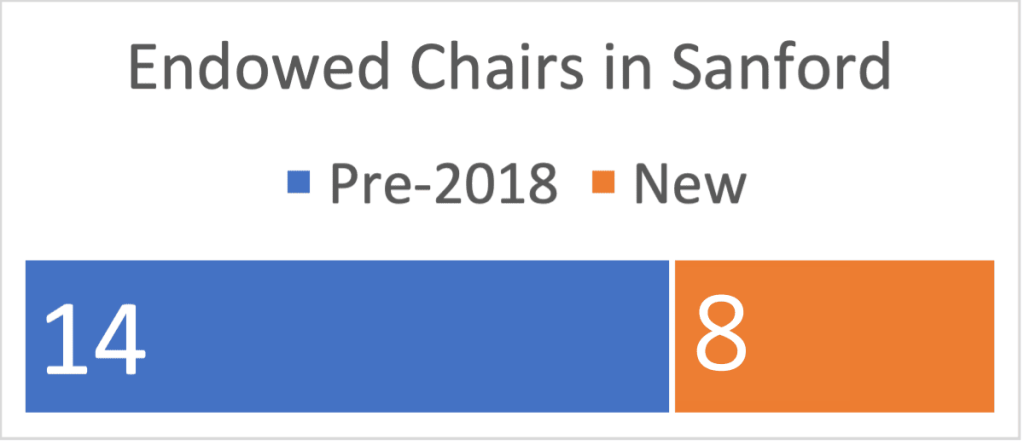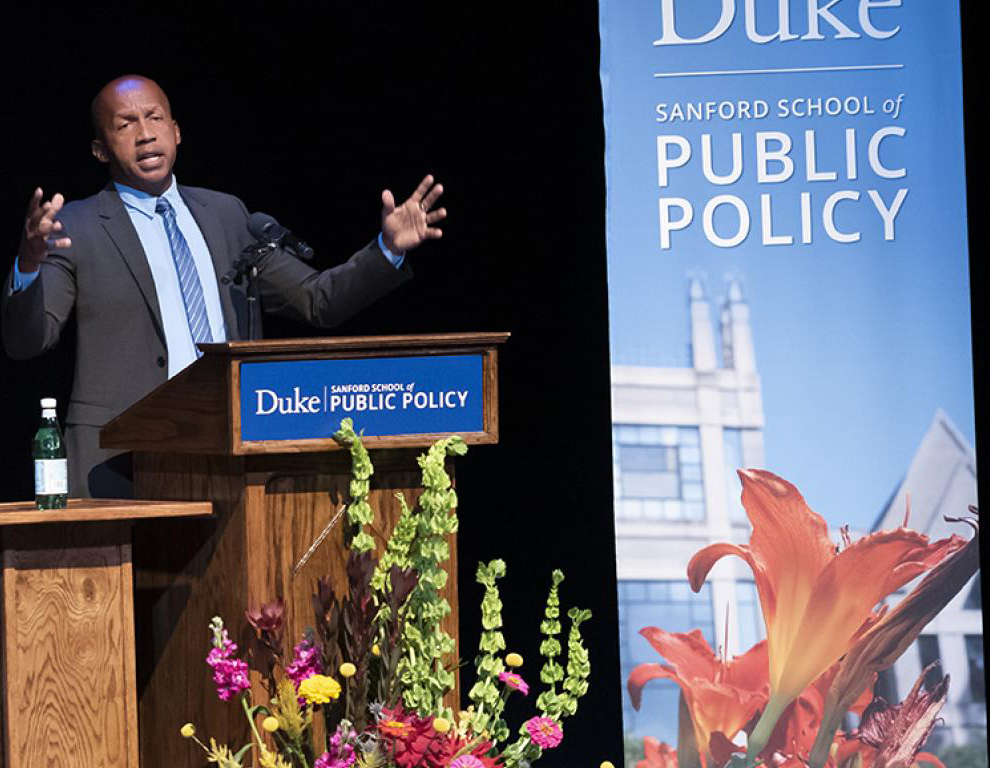Enhance the impact and reputation of our research and expertise.
Today’s grand challenges are rarely purely technical; most are deeply intertwined with behaviors and require policy choices. More than ever, our world needs research and evidence to inform these choices. Thus, we need both to bolster our research and our connections with policymakers.
Goal: Secure endowed faculty positions.

Progress:
Faculty are key to our success. They propel the research and inspire our students. Raising funds to hire the best faculty is a top priority. Endowed chairs are powerful because they enable faculty support in perpetuity, ensuring ongoing faculty strength
• Creating new chairs: We have secured eight new school-owned endowed chairs through philanthropy: two Hart Professor of the Practice positions, the Rosen Family professor of the practice, the Tony & Teddie Brown associate professorship, the Bruce L. Payne associate professorship, the McLain Foundation associate professorship, the Cumber Family professorship and the Fleishman professorship. We also received the school’s first university professorship – the McMahon professorship – from Duke University. This brings the total to 23 chairs owned by the school, increasing the number of chairs by 65% in four years. These new chairs are paying off quickly in terms of our ability to hire.
• Filling endowed chairs: Since the start of the strategic plan, we have hired and filled six endowed chairs, five of which are new to the school, and four of these are newly funded since the start of the strategic plan.
Next Steps:
We are continuing to seek a philanthropic sponsor for a chair in criminal justice. Meanwhile, we have secured expendable support to commence a search next year.

Goal: Find new sources for pilot/seed funding – research productivity.

Progress:
• We have raised enough flexible funds to support the faculty pilot fund for at least the next five years. Over the last three years, we have distributed $166,900 in research pilot funds, resulting in $3.3 million in new external grant awards.
• Our pilot funding program and our investment in a Director of Research Opportunities position resulted in an increase of the amount of submitted research grants from $25 million in 2019 to $89 million in 2022. Overall, our research grant portfolio has increased its three-year average of $15.9 million for the period ending in 2019 to $18.9 million for the period ending in 2022.
• Over the last three years, we have distributed $166,900 in research pilot funds, resulting in $3.3 million in new external grant awards.
• Our pilot funding program and our investment in a Director of Research Opportunities position resulted in an increase of the amount of submitted research grants from $25 million in 2019 to $89 million in 2022. Overall, our research grant portfolio has increased its three-year average of $15.9 million for the period ending in 2019 to $18.9 million for the period ending in 2022.
Next Steps:
• Given the recent submissions, we expect additional growth in research grant activity. We will continue to seek sources to fund faculty and PhD research.

Goal: Increase capacity for research distribution.

Progress:
We created and filled a new Associate Dean for Communications and Marketing position in 2019. This has led to several improvements that are helping us reach wider audiences:
• We increased collaboration with Duke Government Relations and University Communications, which has helped distribute our research more broadly.
• Our participation in policy and news briefings has grown substantially. Sanford faculty have participated in 44 online University media briefings since 2020.
• We are reaching larger audiences with news about faculty research. Sanford amplified faculty research and scholarship via newsletters, social media, podcasts, news, media coverage and print pieces. For the academic year 2021-2022, there were 5,398 media clips featuring the Sanford school and faculty. There were 162 op-eds, commentaries and blog posts. Sanford faculty had 179 media interviews.
• The monthly Sanford Research & Views e-newsletter reached an audience of almost 1,700 by July 2022.
• In 2022, Sanford produced 13 episodes of Policy 360 (8712 downloads) and released three new episodes of Ways & Means (4,107 downloads). WUNC re-released the Arc of Justice podcast series under the WUNC/NPR banner. Sanford also premiered the national public radio version of the Arc of Justice series.
• As of August 2022, Sanford has produced to date 139 episodes of the Policy 360 research podcast, and 42 episodes of the Ways & Means documentary podcast reaching a wide audience from policymakers, students, alumni and the general public.
• Social media contributes to all Sanford Strategic Priorities. The school has experienced growing engagement, reach and followers on all channels, with the most growth in LinkedIn and YouTube, followed by Instagram, Twitter, and Facebook.
• In July 2021, with Duke Web Services, Sanford launched a new website as a pioneering enterprise platform – the first for the entire university.
Next Steps:
We will continue to increase Sanford’s reputation and policy impact by growing event reach, media presence and policy interactions.

Goal: Build strength in key programmatic areas, such as health policy, cybersecurity and technology policy.
Progress: Health Policy
• We hired Kate Bundorf, tenured Jay Pearson and added Nathan Boucher as Sanford faculty.
• We maintained top-10 rankings in US News & World Report.
• We created an MPP concentration in health policy. Of MPP students pursuing a concentration, 17% are focused on health policy.
• Together with the Margolis Center for Health Policy, we launched a new undergraduate certificate program in health policy, which is getting lots of student interest.
Next Steps:
We seek to grow our collaboration with the Margolis Center and Duke’s strategic priorities in health policy.
We are seeking to increasing graduate student financial aid dedicated to health policy. We are seeking to build more interest in the MPP health policy concentration and reach new students.

Progress: Cybersecurity and Tech Policy
• Our footprint in tech policy is on a steep upwards trajectory. Through collaborating across campus, we have built tremendous course offerings in privacy, cyber and tech policy in less than two years. Events include many policymakers.
• Students across campus have engaged in an annual “Cyber Cup” competition, and we have held a Cyber Pitch Competition that is open to students, faculty and the general public and has a $25,000 prize.
• We hired the Steed Family Professor, David Hoffman. We also hired Robyn Caplan, who will start July 1, 2023.
• We are building new executive offerings, with our first cyber security capacity building program in the summer of 2022. More offerings are on the way around the world.
• We created an MPP concentration in technology policy, which has increased student interest.
• We established a Tech Policy Lab, which contains multiple programs that engage students from public policy and across campus.
• We created and launched the Debugger podcast hosted by veteran journalist Bob Sullivan.
• One of our leader researchers in the Tech Policy Lab testified before congress on Data Brokerage and we are engaging policy officials around the world in conversations about cyber policy.
• Our Data Brokerage research was featured on Last Week Tonight with John Oliver, and we worked with his staff for 6 months on the episode.
• We created the Duke Cyber Policy and Gender Violence Initiative.
• We are collaborating with NC partners though the North Carolina Partnership for Cybersecurity Excellence
• We have placed over thirty students in technology policy internships in government, the private sector and civil society
• With a focus on Privacy and Democracy, we are hosting data privacy day events to gather policymakers and stakeholders for discussion around privacy. With a team of student researchers, we have worked with the Federal Trade Commission (FTC) Commissioner Christine S Wilson to explore federal privacy legislation.
Next Steps:
Our vision is to build a world-class program in cyber and tech policy focused on the intersection with democracy, governance, and the lives of citizens. Such a program is vital to building our comprehensive strategy on democracy and governance, which comes together in a three-part thrust through Polis: the Center for Politics, the DeWitt Wallace Center for Media and Democracy and the Sanford Cyber Policy Program . We are exploring possible curricular options that connect with Duke’s undergraduate strengths in computer science and engineering. We are building out a Platform Accountability Project. In 2023, we plan to hold cybersecurity capacity building events in Costa Rica, Thailand and the United Arab Emirates. We are working to increase philanthropic investments.

Goal: Enhance Sanford’s research in international development.
Progress:
- We have appointed a tenure-track faculty leader of the Duke Center for International Development (DCID).
- We brought DCID into the Sanford School structure to enable greater freedom to pursue a research focus.
- DCID has increased efforts to focus on research and to become a development hub for researchers. This effort includes the hire of four Lecturing Fellows who have partnered with Sanford faculty on grants, participated in conferences and workshops and coordinated DCID’s monthly research seminar for faculty and graduate students
- DCID became Duke’s point of contact for numerous development consortium contracts with USAID (aka IDIQs) with the closure of DevLab in A&S. Five sponsored grants have resulted from this change including one for the World Food Policy Center.
- DCID researchers were awarded six major grants and contracts worth over $1.3 million in 2021-2022.
- Through its participation in USAID-funded research consortiums, including RTAC (Research Technical Assistance Center) LASER PULSE, and NORC, DCID has promoted research of core and affiliated faculty to audiences of government and aid practitioners all over the world. Working with NORC, DCID has conducted literature reviews and research to inform and guide USAID’s future strategy to development challenges impacted by climate change and corruption. DCID also continues to provide webinars on ongoing research programs to RTAC faculty.
- DCID core and hub researchers published 7 articles on development in peer-reviewed academic journals in 2022.
Next Steps:
- We continue to invest in this area that includes searches for two Professor of the Practice (PoPs) positions in 2022-2023 to replace recent and planned retirements of PoPs in DCID.
- We will build on collaboration with other research-focused units at Duke, such as the Energy Access Group, to promote research and grants.
- We will further develop and deepen our partnerships with development firms (e.g. RTI), NGOs, think-tanks, practitioners, and private sector investments (e.g. EMIA) to conduct and promote research though workshops, conferences, trainings, and joint proposals for funded projects.
- We will build on and expand partnerships with external partners (e.g. Oxfam and Fort Bragg Civil Affairs Battalion) and alumni to broaden the reach of policy recommendations through research and training.
- We will expand opportunities to engage with professional students (MIDP and MPP) and PhD students on research opportunities facilitated by our faculty.
- We will develop greater infrastructure for supporting faculty in preparation of proposals for international projects and managing reporting requirements for government contracting and grants.
- DCID is revamping its website to promote faculty research and research translation for policymakers and practitioners who can best use it.

Goal: Strengthen faculty mentoring programs.
Progress:
We expanded our team mentoring program to include associate faculty, professors of the practice, lecturers, and research professors.
Next Steps:
We are now following up on recommendations from the faculty on how to strengthen the program further.

Goal: Invest in policy connections and deep two-way engagement.

Progress:
For further examples of policy engagement through teaching see the Undergraduate progress section, “create more immersive, hands-on research and engagement experiences.”
For further examples of faculty policy engagement, visit “faculty research policy engagement 2022 examples.”
Next Steps:
We will continue to increase Sanford’s reputation and policy impact by growing event reach, media presence and policy interactions.

Goal: Facilitate research-thematic conversations, seminars.
Progress:
We have supported several research seminar series in various disciplines and areas including structural inequality, media and democracy, child and family policy, and politics. A new health economics seminar was funded in 2022. Sanford is developing a conference/workshop/speaker series funding program. A new “DeWitt in DC” event series is launching this spring 2023.

Goal: Spur research at the intersection of policy and technology impact.
Progress:
Research has occurred in several areas: data brokerage and privacy, third party code, health insurance choice, platform accountability, media regulation, cyber security capacity building and fact checking.
See above under Goal: Build strength in key programmatic areas, such as health policy, cybersecurity and technology policy.
Next Steps:
Continue to make investments that encourage research at the intersection of our existing policy strengths.
